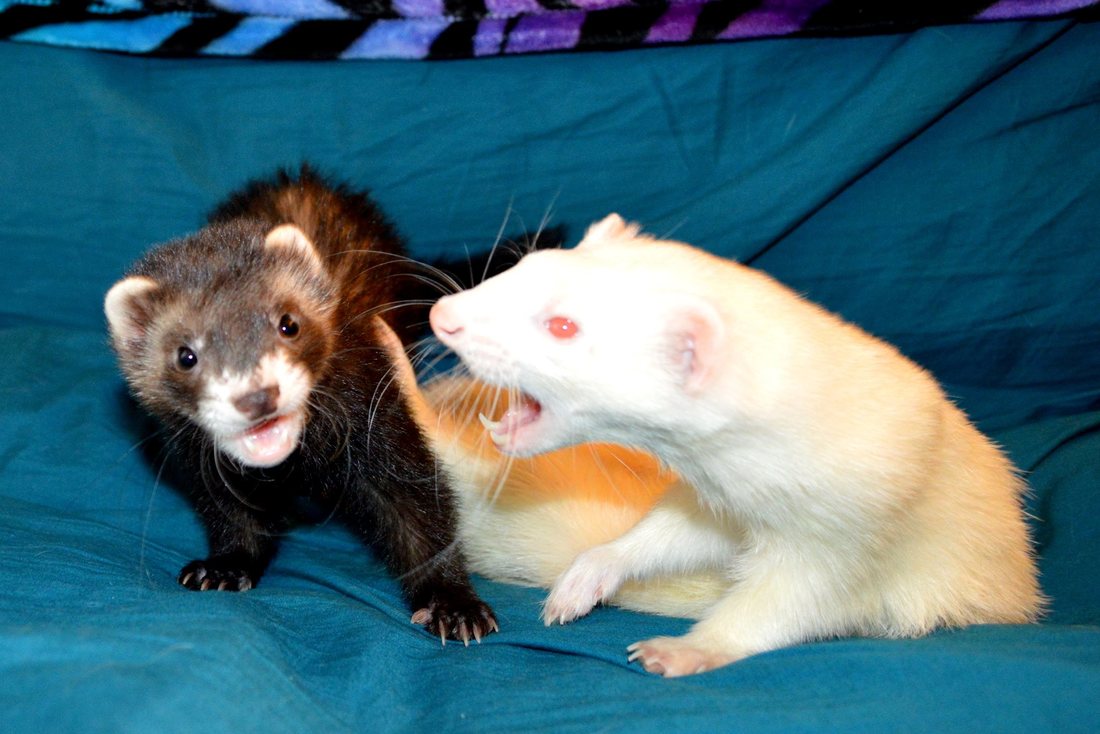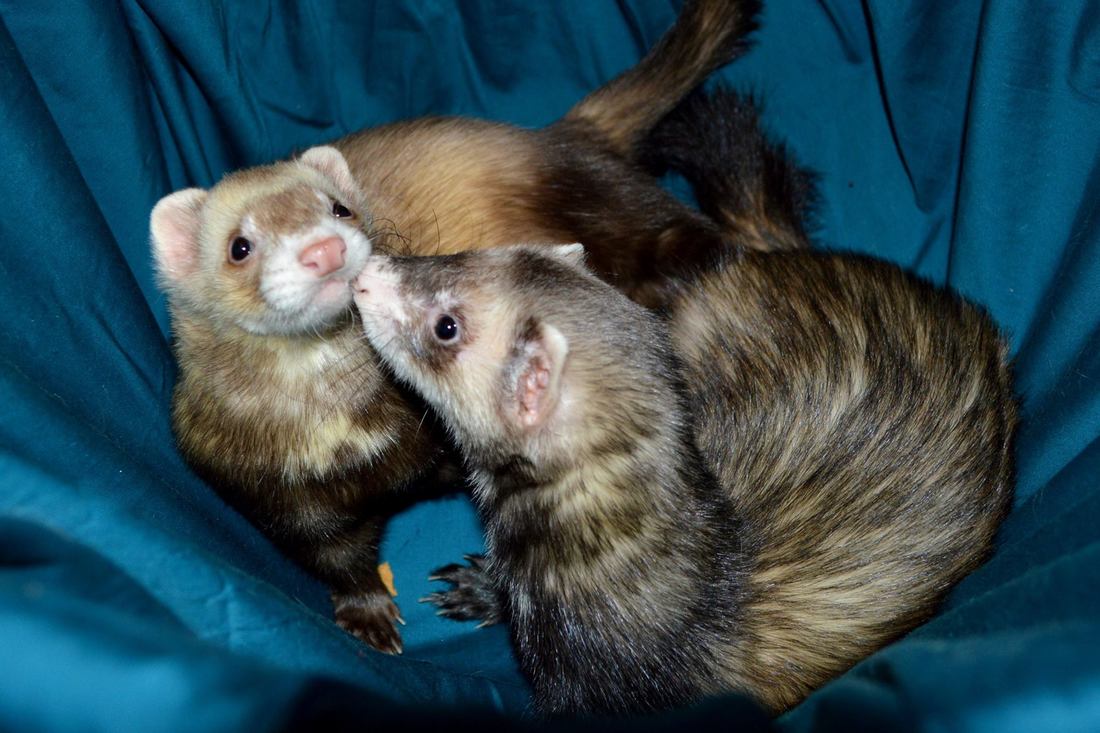|
Here at Ferrets and Friends, we have been hard at work training our two newest ferret recruits how to get along with people. Pabu and Abu have just turned seven months old. At this age, young ferrets are gaining more impulse control so they become easier to train. It's important to remember that ferrets tend to play rough so it is part of their nature to be rough with their human friends. Ferrets can be gentle and affectionate pets, but it is our responsibility to teach them how to best communicate with us. We have put together some of our top tips to help with the communication process. Reduce Opportunities to Learn Bad BehaviorsLike most young mammals, young ferrets have a tendency to explore the world with their mouth. New objects are sampled with their teeth. In their excitement, they will nip at stuffed animals, pillows, furniture, electrical chords, shoes, and even their human caretakers. Their mouth-first approach at life will lesson as they get older and many ferrets naturally grow out of their nippy phase. However, if they discover that a nip at an ankle will produce of fun game of tag with their human companion, then that's something they will not outgrow. To minimize bad behaviors, keep unsocialized ferrets away your face, neck, and elbows. Wear long pants and use whatever foot coverings are the least interesting to your ferret (some may chewing socks, while other find endless entertainment in shoes). Gradually expose your ferret to other interactions at times when your ferret has the best chance of success. For example, towards the end of play time when your ferret is most calm, you may snuggle your ferret near your face or allow your ferret to sniff your feet. These interactions should be brief and followed up with positive reinforcement when your ferret shows calm non-biting behavior. Look for Good Behaviors and Reward ThemCommunication is a two way street. As much as we would like to simply tell our ferrets "don't bite me!", we also have to pay attention to their interests and desires. Ferrets tend to be very quiet pets so it is easy to miss some of their cues for our attention. If your ferret is biting your feet in order to get your attention, chances are that you have already missed several other cues that they have tried which caused them to resort to biting. To avoid problem behavior, look for the behavior that you want to see and respond to that behavior. If your ferret walks over to you and looks up at you, acknowledge their presence and offer your attention. If your ferret appears to be in a playful mood, encourage your ferret to play with toys instead of nipping your hands. Reward good behaviors before they figure out that bad behaviors work better. If your ferret has already developed a biting habit, you can reduce this habit by gradually working backwards towards more acceptable behavior. For example, you can teach your ferret to move from biting to lighter nipping, to licking, and eventually to just sniffing. This is done by rewarding the more tolerable behavior and putting a ferret in a time out for the more severe behavior. As your ferret learns, you continue to move the bar closer to the type of interaction that you want to have with your ferret. This technique has worked well for us with more anxious ferrets. If you have a nippy ferret who gets punished every time they bite you, your ferret may interpret these punishments as you not wanting to interact with them. By rewarding your ferret for more tolerable (but not ideal) behaviors, this teaches your ferret what direction to move towards rather than confusion about your interactions. Find What Works Best for Your FerretEvery ferret is different. For some ferrets, scruffing their neck and a soft hiss easily communicates that a nip was unwanted. Others may get more excited and bite harder! Time outs can be effective deterrents for some ferrets, while others may take the opportunity for a nap. It is equally important to find what motivates your ferret. Some may be motivated by treats, while others enjoy a shoulder scratch, or a chance to play with their favorite toy. Each ferret has an individual personality and has different things that motivate them. It is also important to look at the context of a biting behavior. Ferrets that bite while being held may be trying to communicate that they would like to be put down. Some ferrets may bite when they hear high pitch sounds (such as squeaky toys) or smell certain chemicals. These distress bites should be recognized and appropriate changes should be made to their environment (getting rid of squeaky toys or not wearing strong smelling cologne when handling your ferret). Ferrets are quick learners so if you do not see improvement within a week or two of working with your ferret, try a different tactic. For best results, make sure at least one part of your training involves positive reinforcement.
2 Comments
12/15/2023 10:41:12 pm
Wow! Your site is amazing. Please visit our website. Thanks
Reply
Leave a Reply. |
About the blogFerrets and Friends, LLC has four writers bringing you information on a variety of topics from pets to wildlife, education to conservation, and from new developments in our business to information about our industry. Learn something new each week! Archives
August 2020
Categories
All
|


 RSS Feed
RSS Feed